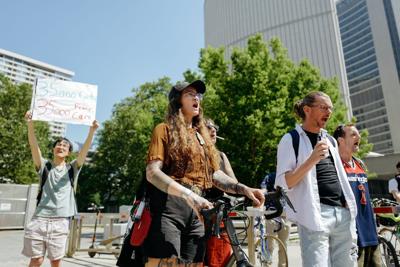ÎÚÑ»´«Ã½nians yelling at each other in front of city hall Tuesday about bike lanes, homeless shelters and other polarizing issues were setting the stage for a bruising 2026 mayoral race, says a veteran observer of local politics.
Zack Taylor, a Western University political scientist, views the Nathan Phillips Square rally by an assortment of critics of Mayor Olivia Chow’s progressive policies, and a noisy counterprotest by supporters of those policies, as part of a firming up of sides in the battle for city hall that won’t be decided for another 15 months.
“We’re seeing people mobilize around issues, but my feeling is this is an early rehearsal, an early mobilization, of the political right — which in ÎÚÑ»´«Ã½ is basically the suburban vote — to identify what and who to co-ordinate around,” he said, so they don’t split the vote in October 2026.
“They want one consensus candidate who can beat Olivia Chow.”
Billed as the ”,” the main rally featured speakers opposing planned homeless shelters in residential neighbourhoods as well as bike lanes on main streets and road lanes being designated transit-only to help speed commuters.
Politicians who spoke included Anthony Furey, a conservative pundit who has failed in bids for the mayor’s chair and a city council seat, and York Centre Conservative MP Roman Baber, a well-known vaccine mandate opponent who is fighting plans for a shelter in his area.
Furey says he is mulling a rematch against Chow if she runs for re-election as expected, after he finished fourth in the 2022 mayoral byelection to replace John Tory. Councillor Brad Bradford, who finished eighth in that byelection and is mulling another mayoral run, was billed as a speaker at the rally but did not attend, citing the need to attend a meeting in City Hall.
Tory, a right-leaning centrist and former Rogers chief executive who resigned as mayor after the Star revealed his inappropriate relationship with a junior member of his office staff, and is mulling a comeback attempt, was not present.
More than 30 people cheered as speakers accused Chow of bringing “shelter chaos to our neighbourhoods,” of conducting “ideological experiments” on ÎÚÑ»´«Ã½’s clogged roadways, and of endangering children by supporting shelters and drug treatment services in residential neighbourhoods.
The speakers were often drowned out, however, by about 20 people who rang bike bells and used a bullhorn to chant slogans including “Shame!”, “Shelters keep us safe,” and “Harm reduction saves lives.”
Taylor said protesters’ radically different visions of the state of ÎÚÑ»´«Ã½, after two years of Chow rule, might seem like the political polarization many people fear has infected federal politics. But, he said, the city has seen heated battles on specific issues and at the ballot box ever since the old city and its surrounding suburbs were forced to amalgamate by Queen’s Park in 1998.
It is unusual, however, to see opponents of the mayor coalescing around different issues this far ahead of the election which is expected to feature lobby groups including Progress ÎÚÑ»´«Ã½, which helped Chow’s 2022 campaign, and , which says its mission is to defeat Chow, a former NDP MP, and “restore common-sense leadership” to city hall.
Daniel Tate, head of IntegrityTO and one of the rally organizers, told the Star he doesn’t “do the whole left-right thing.” He acknowledged the politicians who spoke Tuesday are conservative but said future rallies will include nonconservatives. Chow opponents, he added, are deciding who to support when the mayor’s race officially kicks off in May 2026.
ÎÚÑ»´«Ã½nians in the dueling protests accused each other of representing a tiny minority of residents.
Furey called Chow supporters “the lunatic fringe,” adding that her opponents “represent the regular silent majority of people of all walks of life in this great, beautiful city of ours.”
Marcel Jansen, a cyclist and counterprotester, said bike lane protests are led by business owners “trying to manufacture a problem where there isn’t one.
“The vast majority of people are pro bike lane,” he said, “the vast majority of ÎÚÑ»´«Ã½nians want effective solutions to traffic, and these people are creating an artificial polarization to leverage their power and make themselves larger.”
As the election draws closer, Taylor says, Chow critics will “have to figure out how to amalgamate these issues into something that resembles a program” for change to convince ÎÚÑ»´«Ã½nians they need a new leader.























To join the conversation set a first and last name in your user profile.
Sign in or register for free to join the Conversation